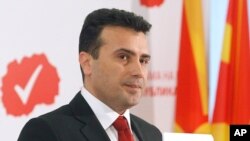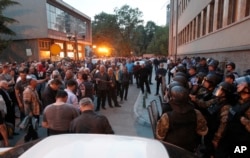Macedonia's parliament speaker urged the country's president on Thursday to recognize a new majority of Social Democrats and parties representing ethnic Albanians so they can form a government and end a volatile political stalemate.
Almost five months after a December 11 parliamentary election, Macedonian nationalists unhappy about the inclusion of minority Albanians are blocking the formation of a new government, compounding the worst crisis in the small Balkan country since it narrowly averted an ethnic civil war in 2001.
The election last week of Talat Xhaferi, a former ethnic Albanian guerrilla, as speaker prompted nationalists to storm into parliament where they assaulted MPs. More than 100 people were injured and the European Union and NATO — both of which Skopje aspires to join — condemned the violence.
Letter to president
In a letter on Thursday, Xhaferi urged President Gjorge Ivanov, a nationalist though not affiliated with any party, to acknowledge the new majority bloc and allow Social Democratic leader Zoran Zaev to form a cabinet.
"I expect the president to act, according to the constitution," Xhaferi said in a statement before heading to Brussels to meet EU officials including Johannes Hahn, the commissioner in charge of EU enlargement.
After the December election in the former Yugoslav republic, Zaev engineered a coalition with two parties representing ethnic Albanians, who make up a third of the 2.1 million population.
The pact, among other things, envisages a law that would allow wider use of the Albanian language, something that has triggered daily street protests by Macedonian Slav nationalists.
But Ivanov refused to give a government mandate to Zaev, saying the coalition deal threatened the country's sovereignty.
Territorial guarantees
Zaev, however, said Thursday that he expected a government to be established this month.
"I am ready, if necessary, to see Ivanov and offer guarantees that the territorial integrity of Macedonia will be respected," Zaev told reporters in Skopje.
Macedonia has been without a functioning government since 2015, when it fell into turmoil over a wiretapping scandal that brought down the ruling nationalist VMRO-DPMNE party bloc.
Efforts to advance toward membership of the EU and NATO have faltered in part over a row with Greece over Macedonia's name, which it shares with a northern Greek province.
The EU has become alarmed in recent months about growing instability in the Balkans, two decades after the devastating ethnic wars caused by Yugoslavia's breakup. The EU's foreign policy chief, Federica Mogherini, said the violence in Macedonia was "particularly worrying" and the crisis "dangerous."






